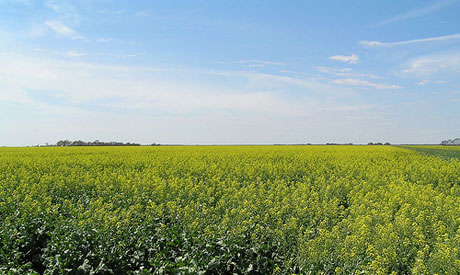
The Oregon State Senate passed legislation on July 1 to ban canola oil production in the state’s Willamette Valley until 2019. The legislation, known as HB 2427, passed in both the state House and Senate with bipartisan support. It bans all commercial production of canola in the three million acre Williamette Protected District, and makes violations subject to fines no greater than $25,000. The bill passed in the Senate 18 to 12, and in the House by 37 to 22. The bill now goes to the Governor.
The bill rolls back a policy adopted by the Oregon Department of Agriculture (ODA) last February that would have allowed 25,000 acres of canola to be planted in the region over the next decade. The production of the plant for its seed has been banned since 2005. The rule adopted by the ODA in February created two zones in the Willamette Valley: one where on canola production is not allowed, and one where canola production is allowed.
“We are gratified the Oregon legislature has overruled ODA’s unlawful action that would have allowed dangerous canola planting into the Willamette Valley. This is a victory for Oregon’s farmers and environment,” said George Kimbrell, senior attorney for Center for Food Safety.
Read more about organic farming
Why Canola Oil and Willamette Valley’s speciality crops can’t co-exist
Canola oil comes from the rapeseed plant, which isn’t edible due to the high amounts of poisonous erucic acid it contains. In the early 1970s, plant breeders developed a rapeseed oil, through genetic engineering, that has low amounts of erucic acid. The Willamette Valley is known for its specialty crops, including various vegetable varieties. Co-existence with canola production is not good for speciality crops, as Bob Reynolds, horticulture professor from Oregon State University, testified in March to the House Agriculture Committee.
Reynolds explained that farmers of specialty crops must meet certain quality standards and if they don’t meet those standards, no matter how high their yield, they get less money. “Consequently, the tolerance for damage from pathogens and insect pests is very low,” he stated. Quality is not an issue for oilseed canola that is sold for biofuel or other oil use because “high yield or low yield, high oil content or low oil content, the crop will be sold.”
Although plant pests are problems in oilseed canola production, there’s “less incentive to control them.”
Read more about canola oil
The Oregon farm advocacy group, Friends of Family Farmers, states that speciality crop farmers “must maintain the utmost seed purity to remain viable and ODA’s new rule does not protect them from substantial canola related risk factors.”
Photo Credit: agrilifetoday




